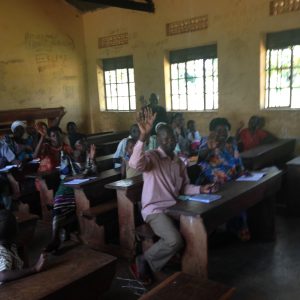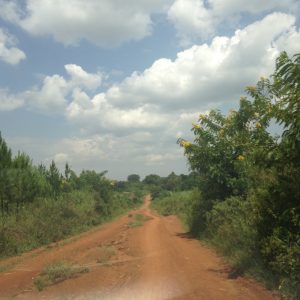 Rural road in Iganga district, on the way to class.
Rural road in Iganga district, on the way to class.
I recently traveled to Uganda to work with rural smallholder farmers as they strive to begin farming as a business. Currently, smallholder farmers in Uganda, operating on 1-10 acres that they often do not own, are barely surviving, and far from thriving. These farmers face a choice: continue the subsistence grind in a changing world, or adopt business and marketing models that can support them, themselves, and their families.
I went to Uganda to work with farmers there on their record-keeping, through the Catholic Relief Services Farmer-to-Farmer Program. (All expenses were paid, they worked with my schedule and my needs, and took care of me every step of the way. I cannot recommend the program more to any person who may have a shred of agronomic or economic advice to offer to small-scale farmers). I taught three classes, two days per class, for members of the Namungalwe Area Cooperative Enterprise, located near Iganga, Uganda, 2.5 hours east of the capital. Through the many talents of my interpreter, Joseph, I discussed with the farmers first what records are (“the world’s oldest writing!”), then why they should keep records (“first and foremost, because we are forgetful”), and then what kinds of records they should be keeping (“if we recorded everything we could possibly record, we wouldn’t have any time for farming!”).
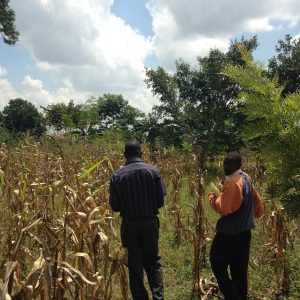 Interpreter Joseph and farmer/future trainer George, showing me a farm.
Interpreter Joseph and farmer/future trainer George, showing me a farm.
One of my successes was embarking on the trip with few expectations. Having never been to Africa and never worked with farmers outside of the United States, I was able to keep an open frame of mind, a frame on which I could hang new information. Into the frame went the new people, who were running women’s cooperatives and educational projects for orphans and a thousand other incredible things, and the new plants, which were almost always foreign to me and sometimes only had names in the local language. Into the frame also went new mindsets, new agricultural practices, new political challenges, new resources, new frustrations, and still more new people and new plants.
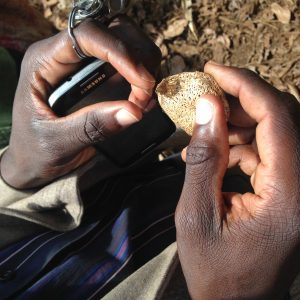 A delicious nut that did not have an English name, but in Lusoga sounded like “coolay-coolah”.
A delicious nut that did not have an English name, but in Lusoga sounded like “coolay-coolah”.
At a point early in the trip, when I had only just begun training, the frame on which I hung my new discoveries felt full, on the verge of collapse. It seemed the journey had already broken me, and that was a profound “oh s#$@” moment. It wasn’t the first “oh s#$@” moment (those started when I was first given my assignment months before), but to have a mental breakdown early in the actual trip made me wonder, “was I ever ready for this? Were my expectations low enough? Should I have just stayed home?”
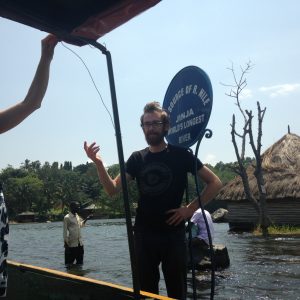 Lots of questions.
Lots of questions.
Desperate to regain control, I stepped back and looked at my mental framework. It wasn’t broken; it was just disorganized. I wasn’t broken; I just hadn’t given myself a moment to reflect. I began reframing all of the information I was receiving within the context of the agricultural, social, and political knowledge I already had. Little by little, I began to see that smallholder farming in Uganda is actually very familiar. Small farmers there, like small farmers here, struggle to find time to be both farmers and businesspeople. The record-keeping and accounting always take a backseat, and therefore rarely gets done.
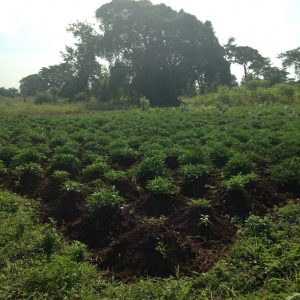 Neat and orderly sweet potatoes in production at one of the schools where I taught.
Neat and orderly sweet potatoes in production at one of the schools where I taught.
Does this sound somehow similar to the work The Land Connection does? It should. Farmers all over the world are called upon to provide for their communities, the people who live around them. In Uganda, poor communities are bolstered by the growers among them and would simply collapse in the absence of agriculture. Here in Illinois, small-scale farmers are modeling what a local economy bolstered by their efforts can add to their community, and even how they can support it when things go sour. In both cases, farmers are foundational to communities. In both cases, farmers must also be accountable for their efforts and their resources, and make the case that their work is worth its costs.
Since my return, friends and family have asked the question, “how was your trip?” It’s a perfectly reasonable and friendly question, and I have greeted it with a pathetic, “well it…hmm…it was…um…” I struggle to know yet what the journey meant to me. At some point, it broke me down, but like a good journey, it is one I am still on, and it is still putting me back together. I would gladly go back to the brick classrooms and dusty roads and tired but determined farmers of rural Uganda again to share whatever it is they think I may be able to help them with. The next time, my frame will be stronger, my teaching will be better, and my students in that far-flung place will benefit more. But still, I am sure the journey will break me and rebuild me again.
